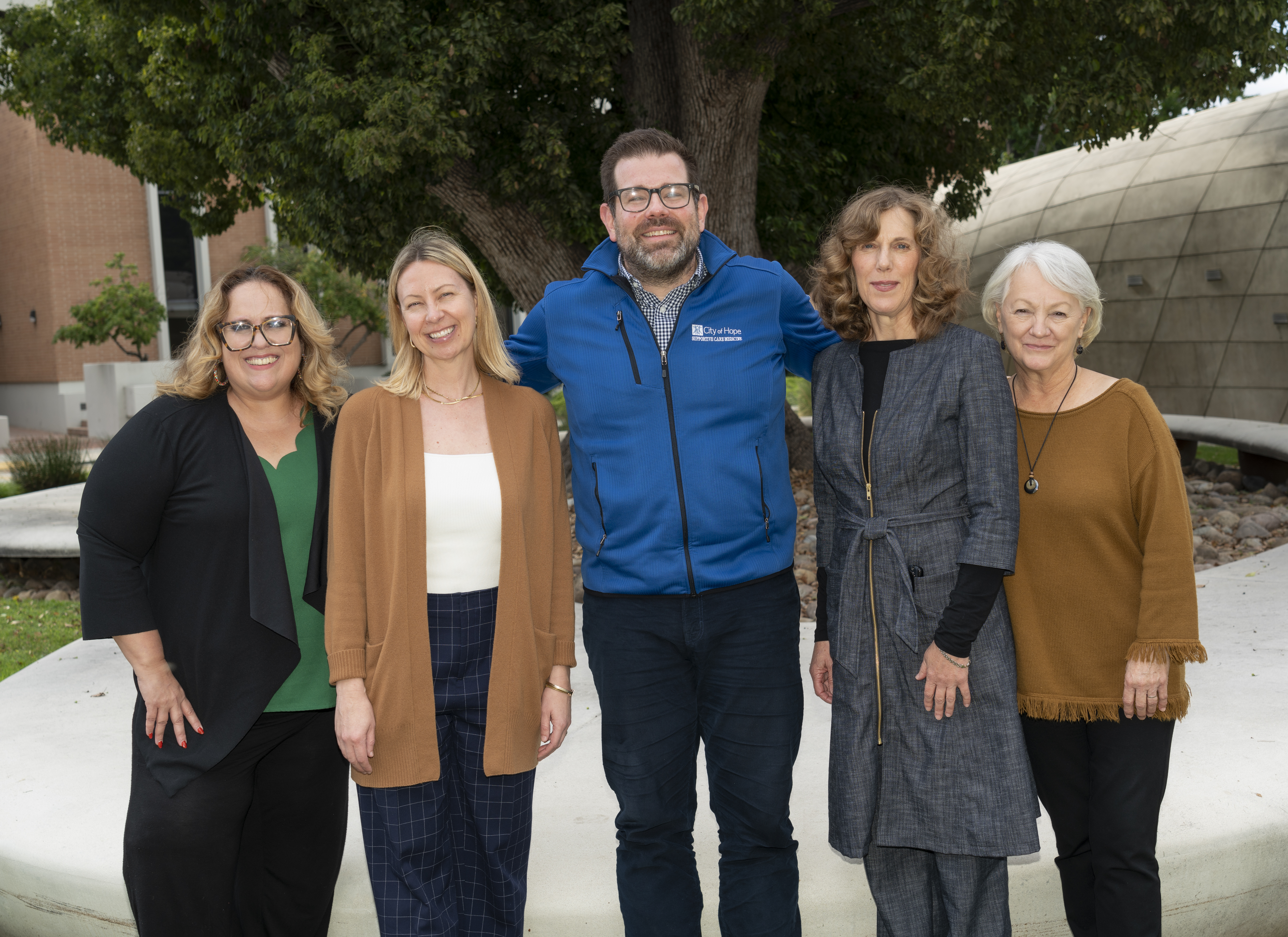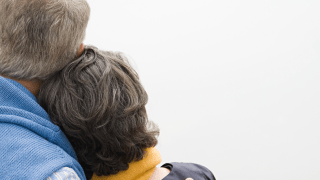The Heaviness of Time
“Fear is universal for all cancer patients,” says Claudia Cuevas, a licensed clinical social worker at City of Hope. “But one thing that is unique about brain cancer is the heaviness of time.”
Although scientists are pursuing promising new research, most people with a malignant brain tumor survive only 12 to 18 months after diagnosis. In addition, the disease progresses quickly —
The stress is enormous, and the weight of losing a loved one so fast is enough to crush even the best of relationships. Couples stop communicating because they don’t want to burden each other. They bottle up emotions. It is an isolating and painful experience that can reduce the patient’s remaining quality of life and have long-lasting negative effects on surviving family members.
For the past year, Cuevas has been working alongside fellow clinical social worker Nicole Peeke as a couple’s clinician for Couples Coping Together Against Brain Cancer, a first-of-its-kind supportive care program tailored for the unique needs of brain cancer patients and their intimate partners. Their goal: to help couples find better ways to communicate, cope and make the most of precious time.

The program —
Partners Matter
Research shows that people in healthy relationships live longer and better. This fact holds true when couples are facing serious illness, too.
"When patients have a supportive partner, they do better with their illness. They’re more consistent with their care. They eat healthier. They exercise more,” says Matthew Loscalzo, M.S.W., executive director, People and Enterprise Transformation, and professor emeritus of supportive care medicine. “They do all of the healthier things because we need other people to encourage us and move us forward."
Loscalzo would know. He started City of Hope’s first Couples Coping With Cancer program in 2006, which has since helped more than 3,500 patients. First created for women facing breast cancer, the program was so successful that City of Hope expanded it to include patients with lung, colon, gynecological and pancreatic cancers. Now, it is serving as the foundation for the brain cancer program.
City of Hope’s couples-focused approach is associated with better patient outcomes, increased patient satisfaction, a decrease in the length of stays in the intensive care unit and significant cost savings to the organization.
Despite such potential benefits, very few health care organizations focus on couples as a team. In fact, Loscalzo says he has yet to find any other program in the world that intentionally integrates committed couples as a standard of cancer care the way the City of Hope does, starting with the very first visit.
“At other institutions, there is a lot of focus on the patient, which is great. But partners and family members suffer as well,” says Cuevas. “In our program, we say ‘partners matter.’”
A System of Support Inspired by Personal Experience
Having a formal system of support for brain cancer patients and their partners is the vision of Lori McGee, whose husband Liam passed away from glioblastoma in 2015.
“It wasn’t until we came to City of Hope that we experienced anything like compassion,” McGee says. “We were at our wit’s end, and coming to City of Hope was like someone threw us a life-preserver.”
“Brain cancer is such a devastating disease,” she continued. “I was the caregiver, and I saw that City of Hope had the skills and tools to enable me and my husband to cope, in addition to receiving the best treatment available.”
In 2022, McGee made a generous philanthropic gift to City of Hope’s Department of Supportive Care Medicine to create Couples Coping Together Against Brain Cancer. Her gift is funding the first three years of the program, with a goal to attract additional funding and expand it on a national scale. Other gifts are already coming in and making an impact —
“While he was still here, City of Hope was able to improve Liam’s quality of life for the time he had left. That’s something everyone should have access to, and together, we’re making that happen,” she says.
Coming Together Against Cancer: A Strengths-Based Approach
Couples Coping Together Against Brain Cancer begins with a meeting with Peeke or Cuevas before the couple sees a doctor for the first time. Cuevas, who is bilingual, supports Spanish-speaking couples.
They use a special screening tool developed at City of Hope to assess everything from the partners’ understanding of the diagnosis to their mental health. It reveals where couples may need extra help and alignment.
“If the partner is thinking there’s a 50% chance of a cure and the patient is saying zero to 25%, we talk about that,” Peeke says. “It’s important to have these conversations because we want couples to feel empowered and prepared for the future.”
City of Hope data shows that nearly a third of couples are misaligned in their understanding of the prognosis. Alignment is essential because unrealistic expectations can impede the healing experience, complicate interactions with doctors, and increase anxiety and depression.
“We model that it’s OK to talk about things that feel scary. We acknowledge what’s lost, but we focus on what’s left,” Peeke adds.
In addition to encouraging open dialogue, the program helps couples identify their individual and collective strengths. This focus on strengths is distinctive and purposeful. It is different than simply processing the emotions of a painful experience.
“We’re very intentional about bringing couples together against the cancer,” Cuevas explains.
“Instead of focusing on the deficits, the unknowns and past hurts, we focus on the current situation and use the strength of their relationship that has kept them together all this time,” adds Peeke.
Throughout the cancer journey —
Some patients need financial assistance. Others need help talking to their young children about cancer. Some people struggle with the spiritual aspects of the end of life and seek guidance from City of Hope’s chaplain, Rev. Jonathan Stoner. In City of Hope’s Department of Supportive Care Medicine, a 160-plus-person multidisciplinary team is available to assist with all these concerns.
“What makes us unique is that we’re very strategic about getting to know these couples and that everything is customized,” says Peeke. “But we couldn’t do it without the partnership of our neuro-oncology colleagues.”
‘Innovation Comes Only Through Philanthropy’
While cancer takes a heavy toll on patients and caregivers, it can also be a catalyst for people to redefine what is most important in their relationships. Couples Coping Together Against Brain Cancer helps make that possible.
One participant said, “We have been married for 50 years, and we’ve never had a conversation like this.”
“I feel so proud of this program,” says Cuevas. "I get messages from adult children saying, ‘My dad is a different person. He’s at every medical appointment. He’s involved. He’s less afraid, and you made this happen.’ So that’s very rewarding.”
At City of Hope, philanthropy is also a catalyst.
Loscalzo says the speed at which this program came together is remarkable. He credits that to two things: 1) having an experienced team in place and 2) philanthropic support from people like McGee.
“Innovation comes only through philanthropy,” he says. “Institutions have to focus on keeping the doors open, dealing with day-to-day operations. Philanthropy frees us to think bigger, to do more.”
“I’m very thankful for Lori and her vision,” says Peeke. “I would like every couple to have this. I really feel this would change the paradigm.”
